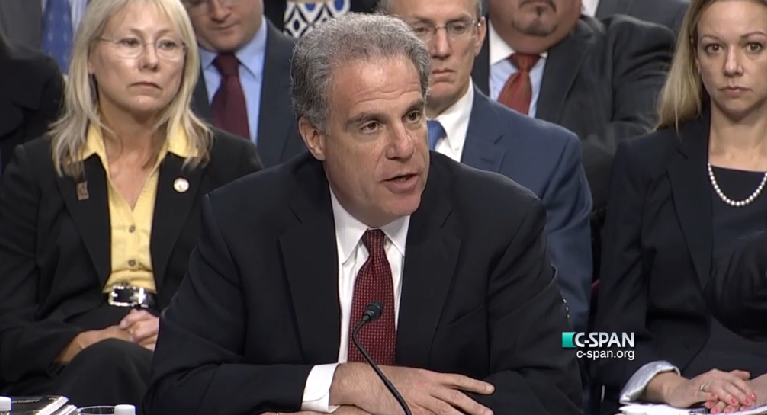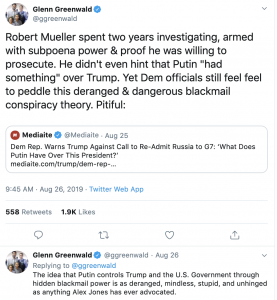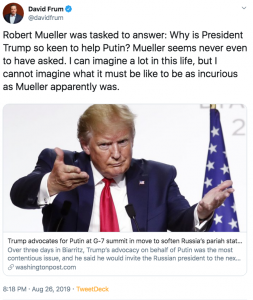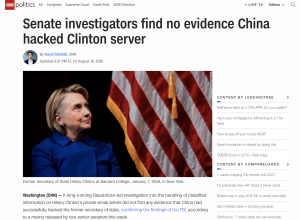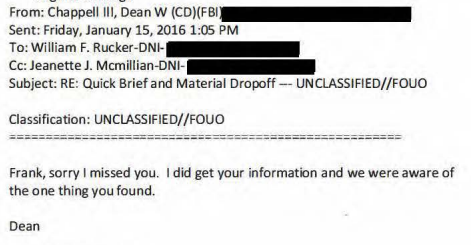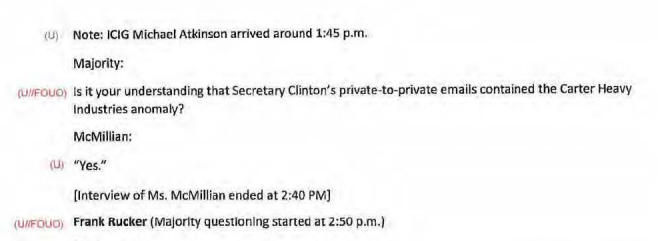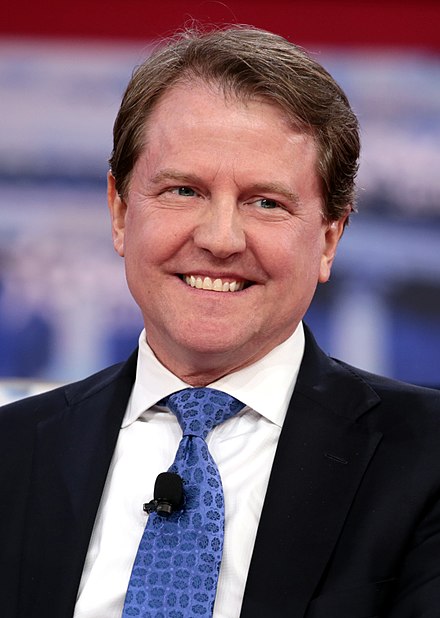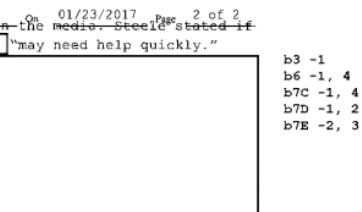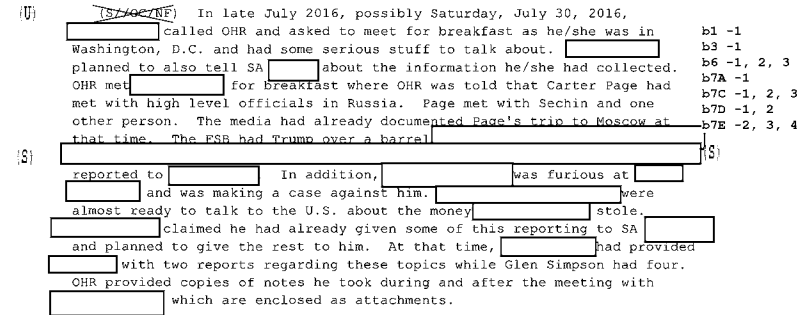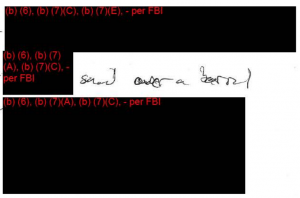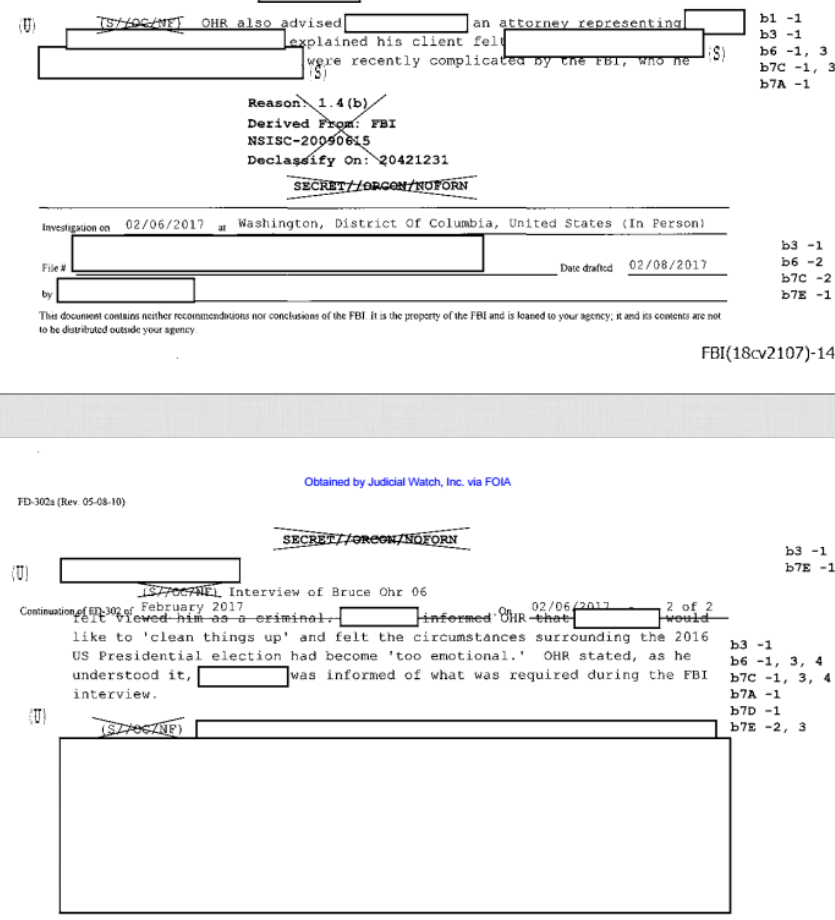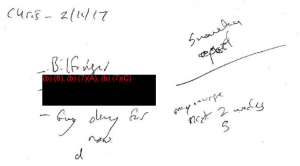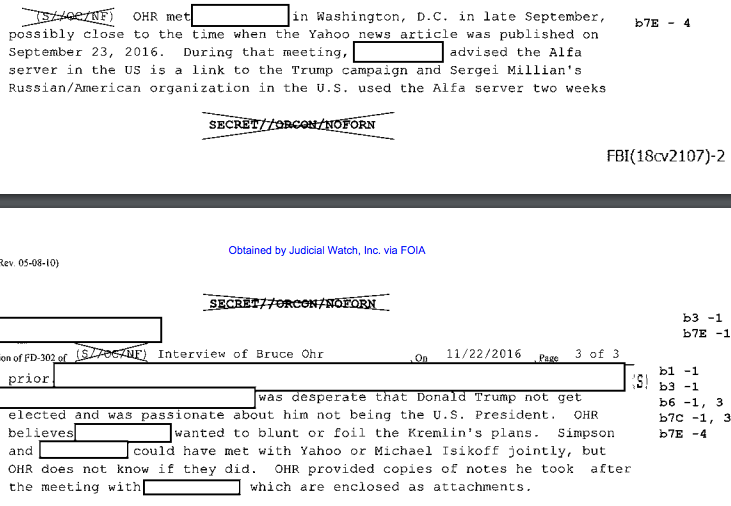When Did Trump Learn Rod Blagojevich Prosecutor Patrick Fitzgerald Had Comey’s Memos?
When Trump was last floating commuting former IL governor Rod Blagojevich’s sentence, he was quite clear he was considering in part because of his animus towards Jim Comey, even though Comey was not in government when Blago was prosecuted.
“His wife I think is fantastic and I’m thinking about commuting his sentence very strongly. I think it’s enough, seven years,” Trump told reporters of Blagojevich who was sentenced to 14 years in federal prison for participating in several “pay to play” schemes (including trying to take back an $8 million contribution Illinois made to Children’s Memorial Hospital because the hospital’s CEO wouldn’t make a campaign donation).
Blagojevich notably attempted to give former Illinois Senator Barack Obama’s vacant seat to the highest bidder but was not officially convicted for it. Recordings obtained by government officials have Blagojevich saying of the seat, “I’ve got this thing and it’s (expletive) golden, I’m not just giving it up for (expletive) nothing.”
Still, in 2011 he was convicted on 17 charges for wide-ranging acts of corruption.
“I thought he was treated unbelievably unfairly; he was given close to 18 years in prison. And a lot of people thought it was unfair, like a lot of other things,” Trump said on Wednesday. “He’s been in jail for seven years over a phone call where nothing happens—over a phone call which he shouldn’t have said what he said, but it was braggadocio, you would say. I would think that there have been many politicians—I’m not one of them, by the way—that have said a lot worse over the telephone.”
The president added that “it was the same gang, the Comey gang and all these sleazebags that did it.” Trump was referring to James Comey, the former FBI director that Trump fired after taking the Oval Office and who is a frequent target of the president’s ire. Comey’s close friend and associate, former U.S. attorney in Illinois Patrick Fitzgerald, led the prosecution against Blagojevich.
Reporters noted that Comey and Fitz were friends, though didn’t go further into reasons why Trump might consider Blago’s prosecution by Fitz to be the work of the “Comey gang” of “sleazebags.” Based on what we learned from the IG Report into Comey’s treatment of his memos recording Trump’s attempts to interfere with ongoing investigations it seems Trump treats Fitz as part of Comey’s gang because of the way those memos got shared.
This probably dates back to April 2018. That month was already crazy given the raid on Michael Cohen’s home and office. Then, during the second half of the month, Trump responded to Comey’s book tour by claiming he leaked classified information, a claim that tried to criminalize Comey’s sharing of his memos.
On April 13, in response to some of Comey’s book coverage, Trump accused him of leaking classified information, perhaps the second time Trump made that accusation (the first was in July 2017).
James Comey is a proven LEAKER & LIAR. Virtually everyone in Washington thought he should be fired for the terrible job he did-until he was, in fact, fired. He leaked CLASSIFIED information, for which he should be prosecuted. He lied to Congress under OATH. He is a weak and…..
— Donald J. Trump (@realDonaldTrump) April 13, 2018
The same day, Trump pardoned Scooter Libby, who had been prosecuted for serving as a firewall to protect the Vice President and President from any consequences for using their classification authority to retaliate against critics. Comey, as Acting Attorney General, appointed Fitz to prosecute Libby. So in that prosecution, at least, they were part of the same “gang.”
On April 15, Trump accused Comey of leaking classified information again.
The big questions in Comey’s badly reviewed book aren’t answered like, how come he gave up Classified Information (jail), why did he lie to Congress (jail), why did the DNC refuse to give Server to the FBI (why didn’t they TAKE it), why the phony memos, McCabe’s $700,000 & more?
— Donald J. Trump (@realDonaldTrump) April 15, 2018
On April 17, Comey’s book officially came out.
On April 19, Comey’s memos got shared with Congress and they promptly got leaked. Trump immediately pointed to them to substantiate a claim Comey leaked classified information again.
James Comey Memos just out and show clearly that there was NO COLLUSION and NO OBSTRUCTION. Also, he leaked classified information. WOW! Will the Witch Hunt continue?
— Donald J. Trump (@realDonaldTrump) April 20, 2018
On April 20, Trump made the accusation again.
James Comey illegally leaked classified documents to the press in order to generate a Special Council? Therefore, the Special Council was established based on an illegal act? Really, does everybody know what that means?
— Donald J. Trump (@realDonaldTrump) April 21, 2018
That same day, the WSJ reported that DOJ’s Inspector General was investigating “classification issues” relating to the four memos Comey shared with Richman, which (the WSJ noted, slightly inaccurately) he believed to be unclassified as shared.
At least two of the memos that former FBI Director James Comey gave to a friend outside of the government contained information that officials now consider classified, according to people familiar with the matter, prompting a review by the Justice Department’s internal watchdog.
Of those two memos, Mr. Comey himself redacted elements of one that he knew to be classified to protect secrets before he handed the documents over to his friend. He determined at the time that another memo contained no classified information, but after he left the Federal Bureau of Investigation, bureau officials upgraded it to “confidential,” the lowest level of classification.
The Justice Department inspector general is now conducting an investigation into classification issues related to the Comey memos, according to a person familiar with the matter. Mr. Comey has said he considered the memos personal rather than government documents. He has told Congress that he wrote them and authorized their release to the media “as a private citizen.”
Mr. Comey gave four total memos to his friend Daniel Richman, a former federal prosecutor who is now a professor at Columbia Law School, people familiar with the matter said. Three were considered unclassified at the time and the one was that was classified contained the redactions made by Mr. Comey.
On April 21, Trump accused Comey of leaking twice more, once by pointing to the WSJ story.
James Comey’s Memos are Classified, I did not Declassify them. They belong to our Government! Therefore, he broke the law! Additionally, he totally made up many of the things he said I said, and he is already a proven liar and leaker. Where are Memos on Clinton, Lynch & others?
— Donald J. Trump (@realDonaldTrump) April 21, 2018
“At least two Memos Comey shared with a friend contained Classified Information.” Wall Street Journal
— Donald J. Trump (@realDonaldTrump) April 21, 2018
On April 24, the Chicago Tribune’s DC office reported that Fitz was representing Comey, along with David Kelley and Daniel Richman.
Finally, on April 27, Trump made the accusation again.
Is everybody believing what is going on. James Comey can’t define what a leak is. He illegally leaked CLASSIFIED INFORMATION but doesn’t understand what he did or how serious it is. He lied all over the place to cover it up. He’s either very sick or very dumb. Remember sailor!
— Donald J. Trump (@realDonaldTrump) April 27, 2018
So back in April 2018, some of this was bubbling to the surface. The public reporting was surely fed by leaks from Congress, though Trump anticipated Congress both with his first accusation and, if it’s connected, the Libby pardon.
But those leaks do not reflect the actual facts as recorded in the Inspector General’s Report (which, of course, was still in process at the time).
As described in this section, on May 14, 2017, Comey transmitted copies of Memos 2, 4, and 6, and a partially redacted copy of Memo 7 to Fitzgerald, who was one of Comey’s personal attorneys. Comey told the OIG he thought of these Memos as his “recollection recorded,” like a diary or personal notes. Comey also said he believed “there’s nothing classified in here,” and so he thought he could share them with his personal attorneys.
Comey told the OIG that, before sharing these Memos with his attorneys, he redacted the second paragraph of Memo 7, which contained a discussion of foreign affairs during which Trump asked Comey to “follow up” on a specific matter. Comey told the OIG he redacted this paragraph because it was “utterly unrelated to what I was seeking their advice and counsel about.” He “did not consider that paragraph classified,” he just thought that “it was irrelevant.” Comey said that he used the personal scanner at his home to make a copy of Memo 7, then used a marker to black out fifteen lines from the second paragraph of the copy of Memo 7. Comey also placed an index card on which he handwritten the word “Redacted” over the center portion of the blacked-out paragraph, further obscuring most of the second paragraph of Memo 7. When Comey was finished redacting, the second paragraph read “He then switched topics…[REDACTED]…then said that I was doing a great job and wished me well. The call ended.” A copy of the redacted version of Memo 7 Comey created is contained in Appendix B to this report.72
Comey then used his personal scanner to create a Portable Document Format (PDF) file containing four of the Comey Memos: un-redacted copies of Memos 2, 4, and 6, and the redacted copy of Memo 7.73 On May 14, 2017, Comey attached the PDF to an email from his personal email account, and sent the email and PDF attachment from his personal laptop to Fitzgerald’s personal email account, with instructions for Fitzgerald to share the email and PDF attachment with Kelley and Richman.
Fitzgerald received the email and PDF attachment from Comey at 2:27 p.m. on May 14, 2017. Fitzgerald forwarded the email and attachments to Kelley on May 17, 2017, at 7:35 a.m., and to Richman on May 17, 2017, at 10:13 a.m. Richman told the OIG that, when he received the email and attachments from Fitzgerald, he accessed the files from his computer, read them, and downloaded a copy into a separate file on his computer. Richman said he did not make any paper copies of the Memos.
Fitzgerald also forwarded the email and attachments from his personal email account on May 17, 2017, at 4:47 p.m. to another email account belonging to Fitzgerald. Fitzgerald then saved the PDF attachment onto his computer, after which he said he placed the incoming email from his personal email account into the “deleted” items folder.
Comey told the OIG that he did not notify anyone at the FBI that he was going to share these Memos with anyone, and did not seek authorization from the FBI prior to emailing these four Memos to Fitzgerald. Comey told the OIG that he deleted his electronic versions of the email and the PDF attachment that he sent, and did not retain a hard copy of either.
72 During the June 2017 classification review, the FBI marked fifteen words from this paragraph as classified, all of which had been obscured by Comey’s redactions. Compare the version of Memo 7 in Appendix A of this report with Comey’s redacted version of Memo 7 in Appendix B.
73 Comey told the OIG that he used his personal shredder to shred the redacted copy of Memo 7 after he had scanned it, instead of returning the redacted copy to his personal safe with the other Memos.
The report makes it clear that Comey redacted memo 7 not because he believed anything in it was classified, but because he believed that discussion, about Egypt and Jordan, was irrelevant to the issues that Fitz et al were representing him on. In any case, the IG concluded that that didn’t amount to leaking classified (confidential) information because Comey redacted it — albeit ineffectively — before he shared it.
More importantly, while Comey intended all four memos to be shared with Richman and Kelley, he did not share them directly. He sent them to Fitz, who sent them on to the two others, though Fitz didn’t get around to it until May 17, three days later.
In the interim, Comey sent Richman photographs of Memo 4, the one recounting Trump directing him to let the Mike Flynn thing go, and directed him to share it with NYT’s Mike Schmidt.
On the morning of May 16, Comey took digital photographs of both pages of Memo 4 with his personal cell phone. Comey then sent both photographs, via text message, to Richman.75 Comey told the OIG that he transmitted this copy of Memo 4 to Richman on May 16 because Comey “had a specific assignment for him.” Comey told the OIG he knew Richman had a close relationship with a reporter for The New York Times. According to Comey, he directed Richman “to share the content[s] of this memo, but not the memo itself, with [the reporter].” Comey also said that, although Richman was his attorney at the time, Comey “didn’t intend to assert any kind of privilege about the direction” he gave to Richman. Comey told the OIG he directed Richman to share the contents of Memo 4 with The New York Times because
I had a conversation with the President of the United States. It was unclassified, on February the 14th. I’m a private citizen. I can talk about conversations I had with the President of the United States. I happen to have that conversation enshrined in an accurate way in this memo. So to ensure that the newspaper gets the most accurate account of my recollection, I’ll send the memo to [Richman]. Tell him, use this; don’t give them the memo, but use this to communicate the substance of it.
Comey told us he needed to do this because it was something he was “uniquely situated to do, because [he was] now a private citizen.” He told us that by speaking out, or enabling someone else to speak out, it would “change the game” and create “extraordinary pressure on the leadership of the Department of Justice, which [Comey did] not trust, to appoint someone who the Country can trust, to go and get those tapes.”
75 On May 16, 2017, Richman had not yet received copies of the Memos from Fitzgerald. Fitzgerald sent the email containing Memos 2, 4, 6, and a redacted copy of Memo 7 to Richman on May 17, 2017, at 10:13 a.m.
So the sharing of that single memo with the press did not involve Fitz, at all.
Importantly, from what I know of Fitz, he probably wouldn’t even have approved of sharing the information, which may be why Comey shared it with Richman directly.
In any case, that memo did not include any classified information, meaning neither Comey nor his lawyers publicly released any classified information (remember, altogether the FBI only determined that one to six words in the memos Comey shared in unredacted form were confidential).
We found no evidence that Comey or his attorneys released any of the classified information contained in any of the Memos to members of the media.
Nevertheless, Trump’s treatment of Fitz as a member of Comey’s “gang” of “sleazebags” seems to be tied to the fact that Comey managed to use the memo showing Trump trying to kill the Mike Flynn investigation to launch the Mueller investigation, even though the facts show that Fitz never had a role in doing so (because he didn’t share the memo in question before Comey sent it to Richman directly).
Given that Trump’s accusations that Comey leaked classified information, I’m interested in whether Trump got a briefing that Michael Horowitz was reviewing that issue before Congress did. Particularly given that Comey shared the memos with Fitzgerald before six words in one of them were retroactively classified, the memos would otherwise amount to attorney client communications (albeit, if you believe that the President ordering the FBI Director to violate FBI rules constitutes official business — something the IG Report didn’t evaluate — memos that were government, not personal, documents).
Granted, in June 2017, when DOJ contacted him about this (while Comey was still testifying), Richman offered up that Comey had shared the memos with all three lawyers. This is not something over which Comey claimed privilege. So even though Trump started basing an attack on attorney-client communications literally at the same time he was complaining about his own attorney-client communications had been seized in a law enforcement search, the discovery of them did not breach attorney-client privilege.
But I’m wondering whether and when and by whom Trump got briefed on this. Did someone give Trump a heads up on what Horowitz was investigating before Congress got one (and why did Congress get that heads up, presumably before conclusions made it clear no classified information got shared with the press?).
The IG Report, like the other ones into the FBI and DOJ officials Trump has attacked as his enemies, doesn’t have some of the normal features of IG Reports, like timelines of the investigation and detailed scope of the interviewees. Such timelines would provide some indication of when the IG knew that Fitz wasn’t in the loop on the NYT story, and so some indication of when someone should have informed Trump in any briefing of that fact, even assuming Trump briefings are accurate about such things or that his brain can process an accurate briefing.
Which is to say, this IG investigation appears to have led the President to draw certain conclusions, possibly including the inaccurate one that Pat Fitz was part of a plot to leak really damning information to the NYT. It may even serve a role in the President’s clemency choices! It would be useful to have more information about how Trump got a mistaken understanding of how the NYT story happened and from whom.


